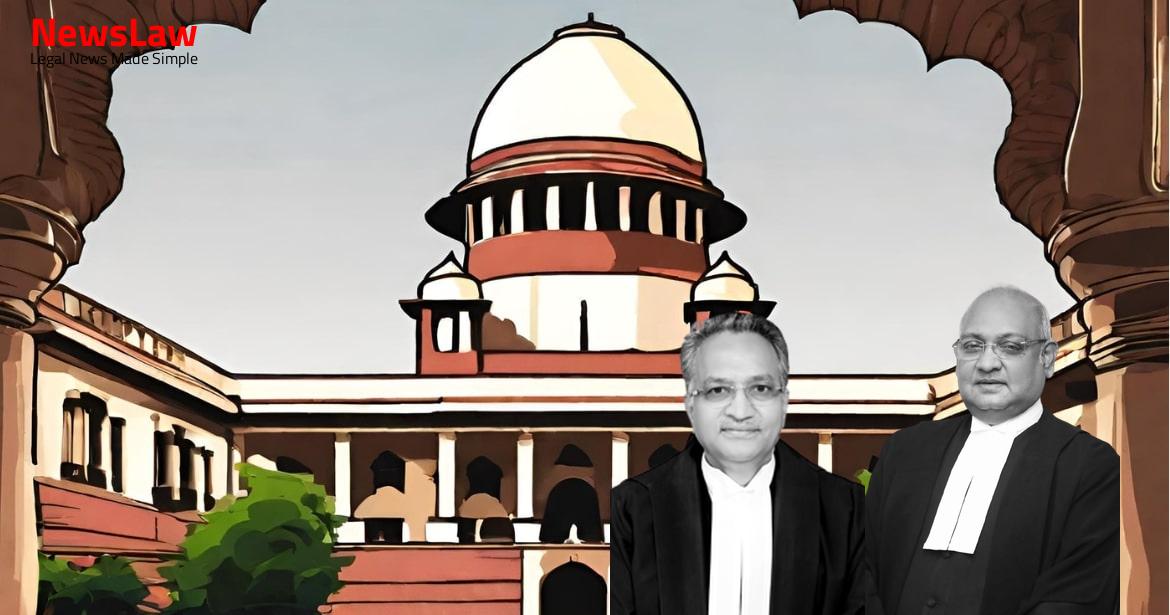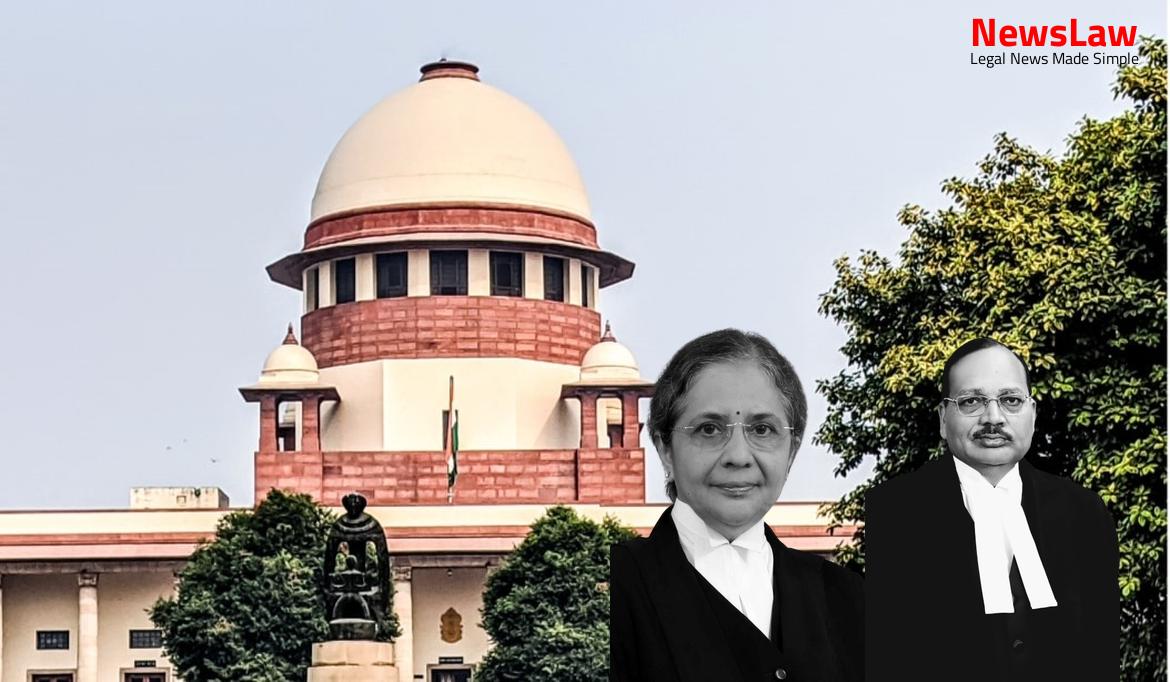Explore the intricate legal analysis undertaken by the Court in a recent rent control case regarding the determination of mesne profits. The Court’s in-depth examination of statutory provisions and legal principles establishes a solid foundation for understanding the complexities of rent control disputes.
Facts
- Plaintiffs filed a suit for eviction, possession, recovery of rent, and permanent injunction in November 2002 under the Old Act.
- The suit was decreed in June 2016, and provisional rent was fixed at Rs. 1,00,000 per month.
- Appellants raised a plea regarding mesne profits under the New Act in a review petition after the Special Leave Petition was dismissed.
- High Court incorrectly mentioned the let-out area in the order under review.
- Plaintiffs filed an application for mesne profits which was granted at Rs. 2,50,000 per month with specific payment directions.
- Plaintiffs became owners of the tenanted premises through sale deeds, leading to the mesne profit application.
- Second Appeal No.144/2017 challenging eviction decree was admitted, and the stay of ejectment was extended multiple times.
- The mesne profit amount of Rs. 2,50,000 per month was disputed by the appellants before the High Court.
- Review petition No.95/2018 was dismissed, leading to the filing of present appeals against the mesne profit orders.
- Plaintiffs purchased the property through six registered sale deeds on 23.12.1985, which was later confirmed in a High Court order from 2007.
- Special Leave Petition No.9775 of 2007 was filed by the appellants, fixing ad hoc provisional rent and directing a decision on standard rent by the Trial Court.
- The Trial Court decreed the suit in August 2009 and fixed the standard rent at Rs. 45,000 per month.
- The High Court’s order to pay mesne profits at Rs. 2,50,000 per month was challenged in the present appeals.
- The appeal No.11/2016 was filed before Additional District Judge No.10, Jaipur and was dismissed on 10.01.2017.
- The judgment of the Trial Court was confirmed by the Additional District Judge No.10, Jaipur.
- The review petition was dismissed by the High Court.
- The High Court noted that the case would be governed by the provisions of the Old Act.
- A Second Appeal No.144/2017 was filed challenging both judgments before the High Court.
- The Second Appeal was admitted on 14.10.2017 and a stay on ejectment was granted.
Also Read: Analysis of Financial Statements as Acknowledgment in Limitation Act Case
Arguments
- The petitioners argue that according to Section 20 of the Rajasthan Rent Control Act, 2001, the maximum mesne profits payable for commercial premises is three times the rent, amounting to Rs.1,35,000 per month.
- They assert that the standard rent for the premises was fixed at Rs.45,000, justifying the three times multiplier.
- The Appellants claim that Section 20 of the New Act should apply to their case, but the Plaintiffs argue that it does not apply to proceedings initiated under the Old Act.
- The High Court’s decision to fix mesne profit at three times the standard rent for a commercial property on the main road of a commercial area is deemed reasonable and equitable.
- The High Court also directed the re-deposit of mesne profits with 9% interest in certain circumstances.
- Overall, the judgment suggests that interference in these appeals is not justified given the context of the case.
Also Read: Interpretation of Corporate Guarantor under IBC
Analysis
- The Court found it reasonable to determine Rs.2,50,000/- per month as mesne profit.
- The findings of fact recorded by the High Court are based on material brought on record and are not perverse or illegal.
- The doctrine of merger does not postpone the termination of tenancy after passing the decree of eviction.
- Applications or proceedings filed under the Old Act pending on the date of commencement of the New Act shall be continued and disposed of in accordance with the Old Act.
- The High Court’s findings were based on voluminous documentary evidence and dispelled the plea taken by the Appellants.
- The High Court’s reasoning in rejecting the review petition is in line with the spirit of Section 32 of the New Act.
- The direction of mesne profits or compensation by the High Court is just equitable and reasonable.
- The basis for determining mesne profit depends on various factors specific to each case such as property location, nature, and prevailing rental rates.
- The High Court rightly rejected the contention that Section 20 of the New Act applies for three times mesne profits to standard rent in cases initiated under the Old Act pending on the commencement of the New Act.
- Tenants have the right to withdraw any pending suits, appeals, or proceedings under the repealed Act within 180 days of the new Act coming into force.
- If a new petition is filed within 270 days of the new Act coming into force, it will be deemed filed on the date of the original suit or appeal.
- Provisions for appeal under the repealed Act will continue to apply to cases disposed of under that Act.
- Prosecutions initiated under the repealed Act will be effective and disposed of in accordance with the repealed law.
- Rules or notifications under the repealed Act in force at the commencement of the new Act will continue to govern pending cases.
- The repeal of the old Act will not affect actions taken, rights acquired, penalties incurred under the repealed Act.
- All pending applications, suits, or proceedings under the repealed Act will be continued and disposed of as if the old Act had not been repealed.
- Upon passing a decree for eviction by a competent Court, the tenant is liable to pay mesne profit or compensation for use and occupation of the premises.
- The amount of mesne profits can be determined based on the rate at which the landlord could have let out the premises and earned profit if the tenant had vacated the premises.
- Reference can be made to the case of Marshall Sons & Co. (I) Ltd. vs Sahi Oretrans (P) Ltd. for guidance on fixing reasonable mesne profits equivalent to market rent for holding over the property.
- In the case of Atma Ram Properties (P) Ltd. vs Federal Motors (P) Ltd., the Appellate Court has jurisdiction to impose reasonable terms and conditions to compensate the decree holder for loss due to delay in execution of the decree.
- The view taken in Atma Ram case was reaffirmed in the case of State of Maharashtra vs Super Max International Pvt. Ltd. by a three Judges Bench.
- The decree of eviction passed by the Trial Court has been confirmed in appeal, with a pending second appeal.
- The order fixing the mesne profit and the order passed on the review petition by the Appellants are deemed appropriate and justified.
- There is no need for any intervention in the determined amount of mesne profit by the High Court.
- The High Court’s decision on the mesne profit amount in the impugned order is upheld as correct and valid.
Also Read: Quashing of FIR and Charge-sheet: Legal Analysis
Decision
- Leave granted.
- Both appeals dismissed.
Case Title: M/S MARTIN AND HARRIS PRIVATE LIMITED Vs. RAJENDRA MEHTA (2022 INSC 663)
Case Number: C.A. No.-004646-004647 / 2022



